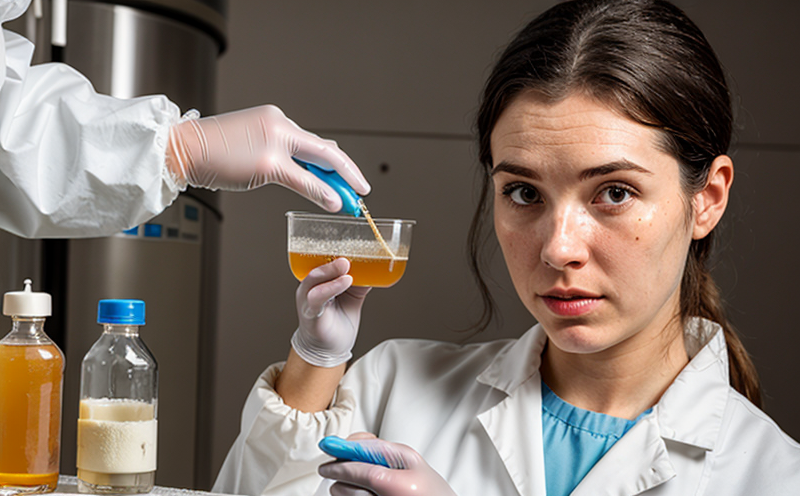Codex Fungal Spoilage Testing in Grains and Cereals
The Codex Alimentarius Commission’s guidelines on the Codex Fungal Spoilage Testing in Grains and Cereals are crucial for ensuring food safety and quality, especially in regions where fungal spoilage is a significant concern. This testing method helps identify potential health hazards related to mycotoxins, which can arise from various molds and yeasts during storage or processing of grains and cereals.
The Codex standards provide a framework that emphasizes the importance of accurate identification and quantification of fungi in food products. By adhering to these guidelines, laboratories can ensure consistent and reliable test results, thereby supporting regulatory compliance and enhancing consumer confidence.
For quality managers and R&D engineers involved with grains and cereals, understanding the specifics of Codex Fungal Spoilage Testing is paramount. This testing involves several critical steps: sample collection, preparation, inoculation for growth, isolation, identification using cultural and biochemical tests, and finally, confirmation through molecular techniques like PCR or sequencing.
The process begins by collecting representative samples from various batches of grains and cereals. These samples are then prepared according to standardized procedures outlined in ISO 21509-3:2020 for grain testing. Once the samples are ready, they undergo inoculation with known fungal strains under controlled conditions.
After incubation periods ranging from a few days to several weeks depending on the species of fungi involved, colonies grow which can be visually inspected and identified based on morphological characteristics. Biochemical tests further aid in differentiating between closely related genera like Aspergillus or Penicillium.
Molecular techniques provide additional precision by confirming identities at the species level. This comprehensive approach ensures accurate identification of fungi present, enabling appropriate measures to be taken against any toxic ones such as those producing aflatoxins (Aspergillus flavus).
Understanding this testing methodology is essential for compliance officers responsible for ensuring adherence to international standards set forth by bodies like the Codex Alimentarius Commission. Compliance with these guidelines not only protects public health but also facilitates trade between countries having different regulatory requirements.
Scope and Methodology
Purpose: This section provides an overview of the scope and methodology for Codex Fungal Spoilage Testing in Grains and Cereals as per ISO 21509-3:2020.
| Procedure | Description |
|---|---|
| Sample Collection | Representative samples should be taken from different parts of the batch ensuring diversity and adequacy for analysis. |
| Preparation | Follow ISO 21509-3:2020 guidelines to prepare grains and cereals for testing, including cleaning, drying if necessary, and grinding into a fine powder where required. |
| Inoculation | Cultivate the prepared samples with known fungal strains under controlled conditions favoring optimal growth rates of target molds. |
| Isolation and Identification | Differentiate between various species using morphological features, biochemical tests, and molecular techniques like PCR or sequencing. |
The identification process includes both cultural methods (growth patterns) and biochemical analyses to confirm the presence of specific molds such as Aspergillus flavus responsible for producing aflatoxins—a potent carcinogen.
Industry Applications
- Quality Assurance: Ensuring only safe and wholesome grains reach consumers by eliminating contaminated batches.
- Regulatory Compliance: Meeting international standards set by the Codex Alimentarius Commission for export/import purposes.
- R&D: Developing new storage techniques or treatments to reduce fungal growth in grains.
- Supply Chain Transparency: Providing clear documentation regarding the quality and safety of grain shipments.
Fungal spoilage testing plays a pivotal role across industries, including agriculture, food processing, pharmaceuticals, and animal feed manufacturing. In particular, it helps protect against mycotoxins that could cause illness or even death if consumed by humans or animals.
| Industry | Main Concerns Addressed |
|---|---|
| Agriculture | Preventing crop losses due to fungal infections during storage and transport. |
| Food Processing | Guaranteeing the safety of final products for consumer consumption. |
| Pharmaceuticals | Avoiding contamination that might affect drug efficacy or stability. |
| Animal Feed Manufacturing | Maintaining nutritional integrity and preventing harm to livestock from harmful molds. |
The results of this testing are critical for maintaining supply chain transparency, ensuring that all parties involved—from farmers to end consumers—are aware of the quality and safety standards being met.
Competitive Advantage and Market Impact
- Enhanced Consumer Trust: By complying with Codex Alimentarius guidelines, businesses demonstrate their commitment to producing safe food products.
- Increased Export Opportunities: Meeting international standards broadens market access for grain producers/exporters.
- Better Resource Management: Identifying and managing fungal contamination early can save significant costs associated with loss or recall.
The competitive advantage lies in being able to offer consistently high-quality products that meet stringent global standards. This is particularly important in the agricultural sector where competition for international markets is fierce.
In terms of market impact, Codex Fungal Spoilage Testing contributes significantly by reducing instances of contaminated grains reaching consumers, thereby mitigating risks associated with mycotoxin exposure. It also fosters innovation within industries related to grain handling and processing, leading to improved practices that enhance overall safety and efficacy.





